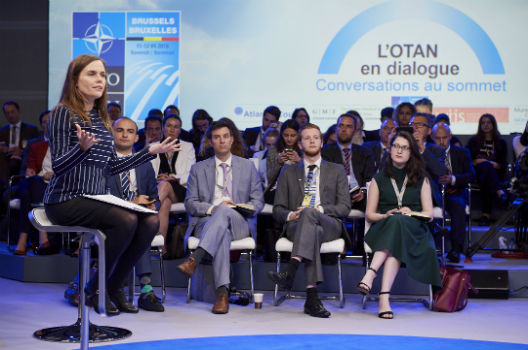 NATO and the international community must focus on more than just military strength when discussing security, Iceland’s Prime Minister Katrin Jakobsdottir said in Brussels on July 12 at the NATO Engages event co-hosted by the Atlantic Council.
NATO and the international community must focus on more than just military strength when discussing security, Iceland’s Prime Minister Katrin Jakobsdottir said in Brussels on July 12 at the NATO Engages event co-hosted by the Atlantic Council.
“I personally think this is the view of the future,” she said. “I think we need to look at security holistically. I think we want to prevent conflict, not just stepping in when conflict has happened.”
By focusing only on defense strength and military action, NATO can miss key elements of peace building, Jakobsdottir argued. “Implementing the [United Nations’ Sustainable Development Goals], thinking about equality, thinking about peaceful institutions, the rule of internal law and order, environment and gender equality—I think all of these issues are also security issues.”
Jakobsdottir, whose country has no standing military and whose political party, the Left-Green Movement, is skeptical of Iceland’s membership of NATO, acknowledged that her views were sometimes counter to her other NATO counterparts. She believed, however, that “coming from the political direction I come from, it is my duty” to speak about these issues and “even though not many other leaders were talking in the same direction I was talking, I also got a positive feedback.”
Despite her reservations about NATO, Jakobsdottir stressed how important international engagement and multilateral institutions were for her small country. “For us being a nation of 350,000 [people]…it is often more difficult for us to have bilateral communications with other bigger nations, and that is why multilateral organizations are very important to Iceland, because there we actually find an audience.”
She emphasized Iceland’s commitment to NATO’s civilian activities and was hopeful that the Alliance was taking seriously many of Iceland’s concerns, especially in the areas of disarmament and nuclear non-proliferation.
During her session, which was moderated by Women in International Security Brussels’ President Corinna Hörst, Iceland’s prime minister singled out gender equality specifically as an area of improvement for the Alliance. “NATO can and should do a lot better when it comes to gender equality… when we have women around the table, in all offices, also in security and defense, we get different solutions, different questions are asked, and the results are better.”
The World Economic Forum has ranked Iceland as the top country in the world for gender equality for nine years in a row, and Jakobsdottir is the country’s second female prime minister. For Jakobsdottir, gender quality is too important to be kept separate from NATO’s debates. “Gender equality shouldn’t be something you talk about when you have [already] spoken about all of the ‘serious’ business, when you have talked about security and military spending, and then we are going to talk about gender equality later in a side room. You have to have it always there. You have to have it as an underlying thought in everything you do and say,” she said.
Jakobsdottir also implored NATO to take more action related to climate change, which she argued “is definitely a key factor when it comes to global security. We will probably see more migration, more social instability because of climate change. Personally, I think this is the biggest challenge we are facing now—how we are going to react to climate change and everyone must participate.”
Climate change is an important policy priority for Iceland, an island country located close to the polar ice caps, which has already adopted an ambitious plan to become carbon-neutral by 2040. “NATO must do something [on climate change], because we all have to deliver our share for this important project,” the prime minister argued.
Jakobsdottir identified cybersecurity as a key vulnerability for her country, whose population has a high level of Internet usage and dependency. She explained that her government is working with the United Kingdom to analyze the challenges cybersecurity poses and she is determined to make Iceland “a leading country when it comes to freedom of information,” while also “ensuring the cybersecurity of all of our institutions.”
Speaking about the NATO leaders’ meeting on July, Jakobsdottir remarked that it was odd to “feel the tension before the meeting and the dinner, and then experiencing much less tension in the meeting and in the dinner than in the media.”
The forty-two-year-old former literature teacher said that this NATO summit would certainly be “a chapter in my biography, and certainly an interesting chapter.”
David A. Wemer is assistant director, editorial at the Atlantic Council. You can follow him on Twitter @DavidAWemer.
Image: Katrin Jakobsdottir, Prime Minister of Iceland, addresses the audience at the NATO Engages event in Brussels, Belgium on July 12.
